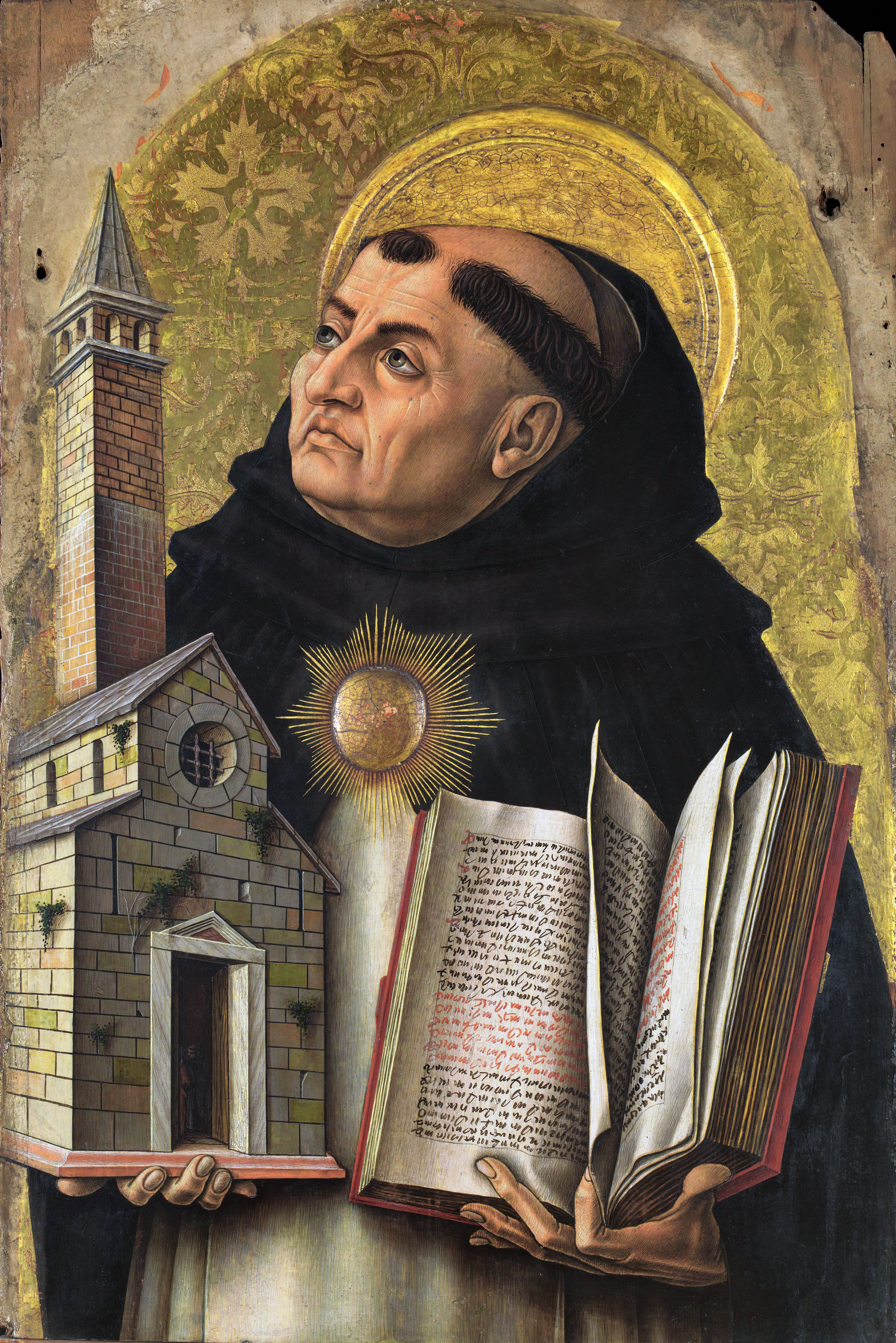
Thomas Aquinas
Thomas Aquinas OP (/əˈkwaɪnəs/, ə-KWY-nəs; Italian: Tommaso d'Aquino, lit. 'Thomas of Aquino'; c. 1225 – 7 March 1274) was an Italian[6] Dominican friar and priest, an influential philosopher and theologian, and a jurist in the tradition of scholasticism from the county of Aquino in the Kingdom of Sicily.
"Aquinas" redirects here. For the ship that sank in 2013, see MV St. Thomas Aquinas. For other uses, see Aquinas (disambiguation).
Thomas Aquinas
Tommaso d'Aquino
1225
Roccasecca, Kingdom of Sicily
7 March 1274 (aged 48–49)
Fossanova, Papal States
18 July 1323, Avignon, Papal States by Pope John XXII
Church of the Jacobins, Toulouse, France
28 January, 7 March (pre-1969 Roman Calendar/traditional Dominican calendar)
The Summa Theologiae, a model church, the sun on the chest of a Dominican friar
Academics; against storms; against lightning; apologists; Aquino, Italy; Belcastro, Italy; book sellers; Catholic academies, schools, and universities; chastity; Falena, Italy; learning; pencil makers; philosophers; Saint Philip Neri Seminary; publishers; scholars; students; University of Santo Tomas; Sto. Tomas, Batangas; Mangaldan, Pangasinan; theologians[3]
Doctor Angelicus (the Angelic Doctor)
- Natural law
- Five proofs of God's existence
- Analogia entis
- Thomistic hylomorphism
- Divine simplicity
- Peripatetic axiom
- Principle of double effect
- Homo unius libri
- Infused righteousness
- Theological intellectualism
- Quiddity
- Just price
- Determinatio
- Actus purus
- Actus essendi
- Thomistic sacramental theology
Thomas was a proponent of natural theology and the father of a school of thought (encompassing both theology and philosophy) known as Thomism. He argued that God is the source of the light of natural reason and the light of faith.[7] He embraced[8] several ideas put forward by Aristotle and attempted to synthesize Aristotelian philosophy with the principles of Christianity.[9] He has been described as "the most influential thinker of the medieval period"[10] and "the greatest of the medieval philosopher-theologians".[11] According to the English philosopher Anthony Kenny, Thomas was "one of the greatest philosophers of the Western world".[12]
Thomas's best-known works are the unfinished Summa Theologica, or Summa Theologiae (1265–1274), the Disputed Questions on Truth (1256–1259) and the Summa contra Gentiles (1259–1265). His commentaries on Christian Scripture and on Aristotle also form an important part of his body of work. He is also notable for his Eucharistic hymns, which form a part of the Church's liturgy.[13]
As a Doctor of the Church, Thomas Aquinas is considered one of the Catholic Church's greatest theologians and philosophers.[14] He is known in Catholic theology as the Doctor Angelicus ("Angelic Doctor", with the title "doctor" meaning "teacher"), and the Doctor Communis ("Universal Doctor").[a] In 1999, John Paul II added a new title to these traditional ones: Doctor Humanitatis ("Doctor of Humanity/Humaneness").[15]
Biography[edit]
Early life (1225–1244)[edit]
Thomas Aquinas was most likely born in the family castle of Roccasecca,[16] near Aquino, controlled at that time by the Kingdom of Sicily (in present-day Lazio, Italy), c. 1225.[17] He was born to the most powerful branch of the family, and his father, Landulf of Aquino, was a man of means. As a knight in the service of Emperor Frederick II, Landulf of Aquino held the title miles.[18] Thomas's mother, Theodora, belonged to the Rossi branch of the Neapolitan Caracciolo family.[19] Landulf's brother Sinibald was abbot of Monte Cassino, the oldest Benedictine monastery. While the rest of the family's sons pursued military careers,[20] the family intended for Thomas to follow his uncle into the abbacy;[21] this would have been a normal career path for a younger son of Southern Italian nobility.[22]
At the age of five Thomas began his early education at Monte Cassino, but after the military conflict between Emperor Frederick II and Pope Gregory IX spilt into the abbey in early 1239, Landulf and Theodora had Thomas enrolled at the studium generale (university) established by Frederick in Naples.[23] There, his teacher in arithmetic, geometry, astronomy, and music was Petrus de Ibernia.[24] It was at this university that Thomas was presumably introduced to Aristotle, Averroes and Maimonides, all of whom would influence his theological philosophy.[25] During his study at Naples, Thomas also came under the influence of John of St. Julian, a Dominican preacher in Naples, who was part of the active effort by the Dominican Order to recruit devout followers.[26]
Works of Thomas Aquinas
Other